Overview
- Brief Narrative
- Brass sign plate from his family’s capmaking business brought with David Mentkewicz, when he, his wife Regina, and their sons, 7 year old Edgar and 4 year old Robert, left Nazi ruled Vienna, Austria, for the United States in September 1938. Salomon and his wife Frieda, operated a capmaking business in their home. When David was old enough, he helped with the work, as did his wife Regina. At one point, they made wool caps for the military. But it was a piecework buisness, and, by the 1930s, capmaking did not bring in enough income to support the family. Germany annexed Austria on March 12, 1938, and enacted anti-Jewish policies stripping Jews of their rights. The Mentkewicz family capmaking business declined and they barely made enough to buy food. Regina was able to obtain visas and permissions to leave with the help of her family. Salomon and his wife Frieda were too elderly to leave. David and his family left in September 1938, and settled in New York. Many years later, they learned that soon after their departure, Salomon was hospitalized until his death in early 1939. Frieda was deported by the Germans to Łódź Ghetto in Poland in approximately 1941-1942, and then transported to Chelmno killing center in 1942.
- Date
-
creation:
before 1938
- Geography
-
use:
Vienna (Austria)
- Credit Line
- United States Holocaust Memorial Museum Collection, Gift of Robert Mentken
- Markings
- front, top center, engraved : S. MIENTKEWITZ / KAPPENMACHER
- Contributor
-
Original owner:
Salomon Mentkewicz
Subject: David Mentken
Subject: Robert Mentken
- Biography
-
Schloma (Salomon) Dawidow Mentkewicz was born circa 1870 in Russia. He married Fradel (Frieda), who was born in approximately 1875 in Russia. They had one son David on March 18, 1895, in Czestochowa, Russia (Poland). The family immigrated in 1905, during the revolt against Czarist Russian oppression in the Kingdom of Poland, and settled in Vienna, Austria. They began calling themselves Salomon and Frieda. The couple ran a capmaking business out of their home. For a while, they specialized in making straw lined, green wool winter military caps with earflaps, buttons, and a visor. David married Regina Haar, who was born 1904 in Krakow. She moved into his parent’s apartment, and they both worked in the capmaking workshop, which now did piecework. Salomon’s first grandson, Edgar, was born on July 7, 1931, and his second, Robert, on January 18, 1934. The family was not well off. David was sentenced to prison for drawing unemployment from the government while earning money selling stoves. His sentence was postponed for two years because he had to provide for a family.
Nazi Germany annexed Austria on March 13, 1938. Anti-Jewish policies were enacted that stripped Austrian Jews of their rights. The capmaking business declined and they could often not earn enough to buy enough food for the family. Regina got her family members in the United States to sign affidavits of support so that her family could obtain US visas. They were the last members of Regina’s family to leave Austria. Before they could receive permission to leave, David had to serve his postponed prison sentence. He was jailed for three weeks, and Regina supported the family by making and selling ladies hats. Salomon and Frieda were too elderly to leave. David, Regina, Edgar, and Robert traveled to Antwerp, Belgium, in early September 1938. Salomon became very ill shortly after they left, and was hospitalized until his death in early 1939. Frieda was deported by the Germans to Łódź Ghetto in Poland in 1941 or 1942 and transported to Chelmno killing center and murdered in 1942.
David Mentkewicz (later Mentken) was born on March 18, 1895, in Czestochowa, Russia (Poland), to a Jewish couple, Schloma Dawidow (Salomon) and Fradel (Frieda) Mentkewicz. In 1905, the Kingdom of Poland revolted against Czarist Russian oppression. The family left Russia and settled in Vienna, Austria. His parents ran a capmaking workshop out of the family home, and David helped as soon as he was old enough. They specialized in making straw lined, green wool winter military caps with earflaps, buttons, and a visor. David married Regina Haar, who was born to prosperous parents, Jonas and Friedel (Fani) Haar on January 27, 1904, in Krakow, Russia (Poland). Regina had an older brother, Maximilian, and three younger sisters, Adela, Ruska, and Sabina. Regina moved into his parent’s apartment, and worked in the capmaking business. Their first son, Edgar, was born on July 7, 1931. A second son, Robert, was born on January 18, 1934. The family was not well off. David was sentenced to prison for drawing unemployment from the government while earning money selling stoves. His sentence was postponed for two years because he had to provide for a family.
Nazi Germany annexed Austria on March 13, 1938, and enacted anti-Jewish policies stripping Austrian Jews of their rights. The capmaking business declined. It was difficult to earn money to buy enough food for the family and they relied on an Anglo-American soup kitchen. Regina got her family in the United States to sign affidavits of support so they could obtain visas to the US. They were the last members of Regina’s family to leave Austria. They obtained visas, but David had to serve his delayed prison sentence before they could receive permission to emigrate. He was jailed for three weeks, and Regina supported the family by selling ladies hats. Salomon and Frieda were too elderly to leave. David, Regina, Edgar, and Robert traveled to Antwerp, Belgium, in early September 1938. They boarded the S.S. Pennland and arrived in the America on September 13, 1938.
The family Americanized their name to Mentken. They moved around Massachusetts looking for steady work. David and Regina divorced in April 1943, because Regina felt that David was unable to adjust to life in the US. Edgar and Robert stayed with their mother. She remarried in 1945, to their building superintendent, Julius Stolz, who had emigrated from Germany in the 1920s. David became a naturalized citizen in 1945. He returned to Austria in the 1950s to find out what happened to his parents. Salomon had been hospitalized shortly after David left in September 1938, and died in the hospital in early 1939. Frieda was deported by the Germans to Łódź Ghetto in Poland in 1941 or 1942 and transported to Chelmno killing center and murdered in 1942. David, age 64, died on September 18, 1959, in Staten Island, New York.
Robert Mentkewicz (later Mentken) was born on January 18, 1934, in Vienna, Austria, to a Jewish couple, David and Regina Haar Mentkewicz. He joined an older brother, Edgar, who was born on July 7, 1931. David was born on March 18, 1895, in Czestochowa, Russia (Poland), to Schloma Dawidow (Salomon) and Fradel (Frieda) Mentkewicz. Regina was born to Jonas and Friedel (Fani) Haar on January 27, 1904, in Krakow, Russia (Poland). Regina had an older brother, Maximilian, and three younger sisters, Adela, Ruska, and Sabina. Robert and his parents lived with his grandparents and the family had a capmaking workshop in the family home. In Russia, they had specialized in making straw lined, green wool winter military caps with earflaps, buttons, and a visor, but now did piecework. The family emigrated to Vienna in 1905 when David was ten. David had worked in the family business since he was a young child. After their marriage, Regina also worked with them, sewing buttons and ironing. The family was not well off. David was sentenced to prison for drawing government unemployment while earning money selling stoves. His sentence was postponed for two years because he had to provide for a family.
Nazi Germany annexed Austria on March 13, 1938. Anti-Jewish policies were enacted that stripped Jews of their rights, prohibited their participation in certain professions, and barred Jewish children from public schools. The capmaking business declined and they could not buy enough food for the family. Regina got her family members in the United States to sign affidavits to support so her family could obtain US visas. They would be the last members of Regina’s family to leave Austria. David had to serve his postponed prison sentence before they could receive departure papers. He was jailed for three weeks, and Regina supported the family by making and selling ladies hats. Robert’s grandparents were too elderly to leave. David, Regina, Edgar, and Robert traveled to Antwerp, Belgium, in early September 1938. They boarded the S.S. Pennland and arrived in the United States on September 13.
The family Americanized their name to Mentken. They moved around Massachusetts as David looked for steady work. Robert’s parents got divorced in April 1943, because Regina felt that his father was unable to adjust to life in the US. Edgar and Robert stayed with their mother. Regina remarried in 1945, to their building superintendent, Julius Stolz, who had emigrated from Germany in the 1920s. Robert graduated from Cooper Union College in 1954 and pursued a career in advertising. David, age 64, died in September 1959. Robert married Ellen in 1964 and they had two sons. Ellen left him in 1975, and Robert raised the children. Regina, age 86, died in June 1990. Edgar, age 70, died in November 2001. Robert traveled to Austria in 2007 to learn what had happened to his paternal grandparents. Salomon had been hospitalized shortly after Robert and his family left in September 1938, and died in the hospital in early 1939. Frieda was deported by the Germans to Łódź Ghetto in Poland in 1941/42 and, in 1942, and was transported to Chelmno killing center.
Physical Details
- Language
- German
- Classification
-
Information Forms
- Category
-
Signs and signboards
- Object Type
-
Nameplates (plaques) (lcsh)
- Physical Description
- Rectangular polished, discolored, brass plaque with two lines of German text engraved on the front. There are four small drill holes, one in each corner. The front is lightly scratched and the back is dull and stained with corrosion.
- Dimensions
- overall: Height: 2.250 inches (5.715 cm) | Width: 5.875 inches (14.923 cm)
- Materials
- overall : metal
Rights & Restrictions
- Conditions on Access
- No restrictions on access
- Conditions on Use
- No restrictions on use
Keywords & Subjects
Administrative Notes
- Legal Status
- Permanent Collection
- Provenance
- The sign was donated to the United States Holocaust Memorial Museum in 2004 by Robert Mentken.
- Record last modified:
- 2022-09-06 13:31:01
- This page:
- https://collections.ushmm.org/search/catalog/irn516701
Download & Licensing
In-Person Research
- By Appointment
- Request 21 Days in Advance of Visit
- Plan a Research Visit
- Request to See This Object
Contact Us
Also in David Mentken family collection
The collection consists of a portrait drawing, a silhouette, a shop sign, three pairs of capmaker’s scissors, correspondence, documents, and photographs relating to the experiences of Salomon Mentkewicz, his family, and the Haar family before the Holocaust in Vienna, Austria, and Krakow, Poland, and to the emigration of David and Regina Haar Mentkewicz (later Mentken) and their sons, Edgar and Robert, to the United States in 1938.
Date: 1905-1978
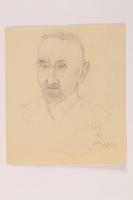
Pencil portrait of his father brought to the US by a Jewish refugee from Vienna
Object
Portrait of his father, Salomon, brought with David Mentkewicz, when he, his wife Regina, and their sons, 7 year old Edgar and 4 year old Robert, left Nazi ruled Austria for the United States in September 1938. Germany annexed Austria on March 12, 1938, and enacted anti-Jewish policies stripping Jews of their rights. The Mentkewicz family capmaking business declined and they barely made enough to buy food. Regina was able to obtain visas and permissions to leave with the help of her family, many already in the US. Salomon and his wife Frieda were too elderly to leave. David and his family left in September 1938, and settled in New York. Many years later, they learned that soon after their departure, Salomon was hospitalized until his death in early 1939. Frieda was deported by the Germans to Łódź Ghetto in Poland in approximately 1941-1942, and then transported to Chelmno killing center in 1942.
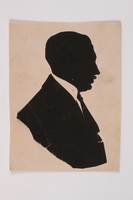
Small silhouette of his father brought to the US by a Jewish refugee from Vienna
Object
Small silhouette of his father, Salomon, brought with David Mentkewicz, when he, his wife Regina, and their sons, 7 year old Edgar and 4 year old Robert, left Nazi ruled Austria for the United States in September 1938. Germany annexed Austria on March 12, 1938, and enacted anti-Jewish policies stripping Jews of their rights. The Mentkewicz family capmaking business declined and they barely made enough to buy food. Regina was able to obtain visas and permissions to leave with the help of her family. Salomon and his wife Frieda were too elderly to leave. David and his family left in September 1938, and settled in New York. Many years later, they learned that soon after their departure, Salomon was hospitalized until his death in early 1939. Frieda was deported by the Germans to Łódź Ghetto in Poland in approximately 1941-1942, and then transported to Chelmno killing center in 1942.1942.
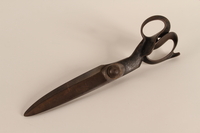
Very large Henckels fabric shears from the family capmaking business brought to the US by a Jewish refugee
Object
Very large Henckels brand fabric scissors with a 7 inch blade brought with David Mentkewicz, when he, his wife Regina, and their sons, 7 year old Edgar and 4 year old Robert, left Nazi ruled Vienna, Austria, for the United States in September 1938. The scissors were used in the family capmaking business operated out of their home. David had helped his parents, Salomon and Frieda, with the work as soon as he was old enough. When he married, his wife Regina also worked making caps. At one point, they made wool caps for the military. But by the 1930s it was a piecework business, and did not bring in enough income to support the family. On March 13,1938, Austria was annexed by Nazi Germany. Anti-Jewish policies were enacted stripping Jews of their rights. The family capmaking business declined and they barely made enough to buy food. Regina was able to obtain visas and permissions to leave with the help of her family in the US. Salomon and his wife Frieda were too elderly to leave. David and his family left in September 1938, and eventually settled in New York. Many years later, they learned that soon after their departure, Salomon was hospitalized until his death in early 1939. Frieda was deported by the Germans to Łódź Ghetto in Poland in 1941 or 1942, and transported to Chelmno killing center in 1942.
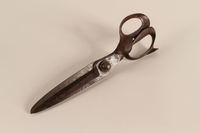
Large black painted fabric shears from the family capmaking business brought to the US by a Jewish refugee
Object
Large fabric scissors with a 5 inch blade brought with David Mentkewicz, when he, his wife Regina, and their sons, 7 year old Edgar and 4 year old Robert, left Nazi ruled Vienna, Austria, for the United States in September 1938. The scissors were used in the family capmaking business operated out of their home. David had helped his parents, Salomon and Frieda, with the work as soon as he was old enough. When he married, his wife Regina also worked making caps. At one point, they made wool caps for the military. But by the 1930s it was a piecework business, and did not bring in enough income to support the family. On March 13,1938, Austria was annexed by Nazi Germany. Anti-Jewish policies were enacted stripping Jews of their rights. The family capmaking business declined and they barely made enough to buy food. Regina was able to obtain visas and permissions to leave with the help of her family in the US. Salomon and his wife Frieda were too elderly to leave. David and his family left in September 1938, and eventually settled in New York. Many years later, they learned that soon after their departure, Salomon was hospitalized until his death in early 1939. Frieda was deported by the Germans to Łódź Ghetto in Poland in 1941 or 1942, and transported to Chelmno killing center in 1942.
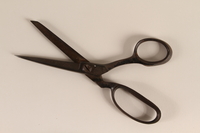
Small black painted scissors from the family capmaking business brought to the US by a Jewish refugee
Object
Small fabric scissors brought with David Mentkewicz, when he, his wife Regina, and their sons, 7 year old Edgar and 4 year old Robert, left Nazi ruled Vienna, Austria, for the United States in September 1938. The scissors were used in the family capmaking business operated out of their home. David had helped his parents, Salomon and Frieda, with the work as soon as he was old enough. When he married, his wife Regina also worked making caps. At one point, they made wool caps for the military. But by the 1930s, it was a piecework business, and did not bring in enough income to support the family. On March 13,1938, Austria was annexed by Nazi Germany. Anti-Jewish policies were enacted stripping Jews of their rights. The family capmaking business declined and they barely made enough to buy food. Regina was able to obtain visas and permissions to leave with the help of her family in the US. Salomon and his wife Frieda were too elderly to leave. David and his family left in September 1938, and eventually settled in New York. Many years later, they learned that soon after their departure, Salomon was hospitalized until his death in early 1939. Frieda was deported by the Germans to Łódź Ghetto in Poland in 1941 or 1942, and transported to Chelmno killing center in 1942.
Mentkewicz (Mentken) family papers
Document
The papers consist of documents and correspondence relating to the immigration of the family of David and Regina Haar Mentkewicz (later Mentken) and their sons, Robert and Edgar, originally of Vienna, Austria. Includes documentation related to their lives in Vienna, immigration to the United States in September 1938 on the SS Pennland, and material related to the pre-war business of Salomon Mentkewicz, David's father. Includes pre-war photographs of the extended Mentkewicz and Haar families and restitution claims for property that was confiscated.



